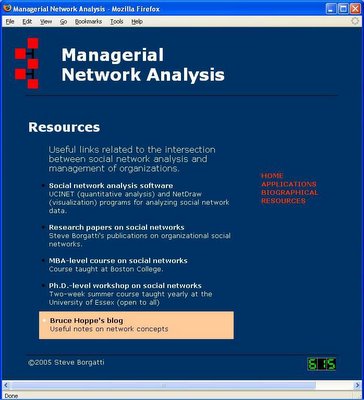 Within the subset of commonly used keywords above, notice how many are names of other people.
Within the subset of commonly used keywords above, notice how many are names of other people.In my blogging practice, I have found writing about my fellow social networking enthusiasts to be beneficial on many levels. It's a good discipline to keep me informed on what's happening, and prevents me from reinventing the wheel. It's also a great way to build relationships with these esteemed colleagues, who are generally good at filtering out unwanted attention, but still appreciate concisely thought-out posts on their work. And, as the above graphic shows, name-dropping on Connectedness attracts hits. By comparison, notice how often people find Connectedness by Googling "Bruce Hoppe."
The problem with name-dropping is its superficiality. Or is that really a problem? The other day David Krackhardt gave me a call and we commiserated on this question. To get the gist of our conversation, I recommend you read Martin Kilduff and David Krackhardt's paper, "Bringing the individual back in: A structural analysis of the internal market for reputation in organizations." The abstract includes this provocative quote:
We found, as predicted, that being perceived to have a prominent friend in an organization boosted an individual's reputation as a good performer, but that actually having such a friend ... had no effect.Of course, as long as people know you have a prominent friend, then actually having that prominent friend doesn't hurt either. That's why I still appreciate gestures like Steve Borgatti's link to Connectedness from his Managerial Network Analysis page:
 Copyright (c) 2005 Connective Associates, except where otherwise noted.
Copyright (c) 2005 Connective Associates, except where otherwise noted.


No comments:
Post a Comment